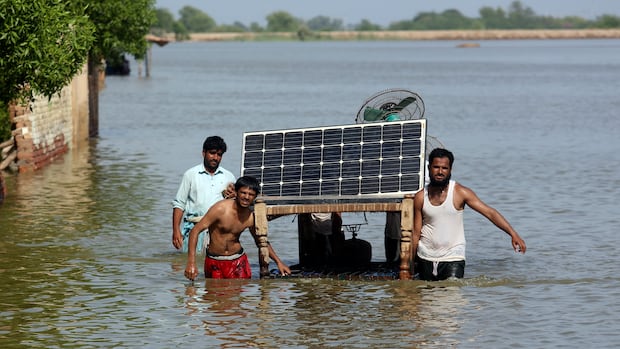COP30 Misses Fossil Fuel Deal, Yet Global Clean Energy Transition Accelerates Amid U.S. Absence & Emerging Climate Leadership
 Brazil
Climate Change
Brazil
Climate Change

Despite COP30's failure to secure a fossil fuel transition deal in Brazil, global momentum for clean energy grows. Developing nations lead the shift, while US a
COP30: A Missed Deal, But Global Energy Transition Forges Ahead
The recent UN climate summit, COP30, held in Belém, Brazil, concluded without a consensus deal on transitioning away from fossil fuels. Despite this setback, experts view the mere inclusion of the topic on the agenda as a significant indicator of escalating global momentum towards clean energy. This shift is occurring even as the United States, traditionally a key player in climate diplomacy, remained absent, opening doors for other nations to assert leadership.
Developing Nations Lead the Renewable Charge
The acceleration towards renewable energy is particularly evident in developing countries, eager to leverage the plummeting costs of solar and wind power. A compelling example comes from Pakistan. In 2022, devastating floods, exacerbated by melting glaciers, displaced a third of its population and crippled infrastructure. In response, communities rapidly embraced solar energy, with the province of Sindh rebuilding homes featuring solar panels. By 2024, Pakistan had astonishingly added 22 gigawatts of solar capacity—surpassing Canada's historical installations. This demonstrates a clear global trend: while the U.S., the world's largest oil producer, doubles down on fossil fuels, many other nations are decisively moving towards sustainable alternatives.
The COP30 Stalemate and Emerging Climate Dynamics
Negotiating a roadmap for phasing out fossil fuels was a late but crucial addition to the COP30 agenda. Although a deal remained elusive due to strong objections from some petrostates, particularly Saudi Arabia, the fact that approximately 80 countries, including major European economies and climate-vulnerable developing nations, supported a transition proposal highlights a growing international consensus. Andreas Sieber, a policy expert at 350.org, notes that this global movement stands in stark contrast to U.S. President Donald Trump's past stance, emphasizing that the majority of the world is progressing regardless.
China, for instance, is seeing 25% of its economic growth from green technologies, while India is ambitiously building its own vast solar industry. These examples underscore the inevitable direction of energy transition, now primarily a matter of pace.
The Dual Rise of Fossils and Renewables
The world is dangerously close to exceeding the 1.5°C global warming limit set by the 2015 Paris Agreement. Concurrently, global fossil fuel emissions have surged by 10% since 2015, with China alone contributing nearly a third of global greenhouse gas emissions due to its coal-fired power plants. However, the shift to renewables is becoming increasingly unavoidable due to falling costs. In the first half of 2025, renewables generated 34.3% of global electricity, surpassing coal for the first time. Projections indicate that global renewable power capacity will double within the next five years.
China's role in this transition is pivotal. Delegates at COP30 reportedly flocked to China's pavilion, keen to tap into its affordable renewable energy revolution. China dominates 70% of the global electric vehicle market, has significantly reduced solar panel costs, and controls much of the world's critical minerals for clean energy technologies.
Sieber points out that a primary impediment to faster progress is the colossal scale of global fossil fuel subsidies, estimated to be between $1.5 trillion and $7 trillion annually. Despite renewables often outperforming fossil fuels on price, these subsidies artificially slow the transition.
A Multipolar Climate Leadership Emerges
The U.S. absence from COP30 marked a significant diplomatic void, but it has inadvertently fostered a new landscape of distributed climate leadership. Indu K. Murthy, head of climate, environment, and sustainability at India's Center for Study of Science, Technology and Policy, describes an emerging “multipolar climate leadership.” Beyond China's expanding influence, host Brazil is championing forest conservation, while India serves as a crucial bridge between developed and developing nations, focusing on equity and adaptation finance.
The U.S. traditionally played a key role in climate finance. Its absence may have widened the funding gap for developing countries, shifting responsibility onto nations like India, China, and Brazil to push their own priorities and solutions.
The Path Forward for Fossil Fuel Transition
Following the initial enthusiasm at COP30 and subsequent opposition, the fossil fuel transition agreement stalled. However, the momentum continues outside the summit halls. Colombia and the Netherlands are set to co-host the first international summit dedicated to phasing out fossil fuels next year, aiming to build on the support from the 80+ countries that backed the proposal at COP30.
As Olivia Bisel, an energy analyst at Carbon Tracker, highlights, the market is independently shifting towards renewables, making investments in traditional oil and gas increasingly risky. This rapid global adoption, particularly in developing countries, challenges the continued push for fossil fuel infrastructure, like new pipelines in Canada. Governments must recognize that relying on past energy strategies will not guarantee success in a world undergoing a fundamental energy transformation.